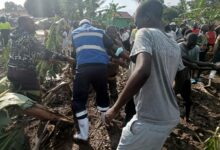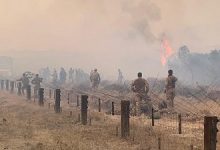A week after the shooting of peaceful demonstrators in Lagos, Nigeria’s army has admitted its soldiers were deployed to restore order, but denied they opened fire on the gathered crowd protesting against police brutality.
At least 10 protesters were killed in the Lekki plaza shooting on October 20, according to Amnesty International.
The army had maintained that its troops were not at the site, but late on Tuesday a military spokesman, Major Osoba Olaniyi, said soldiers were sent to enforce a curfew. However, he denied that the troops shot at the protesters.
“At no time did soldiers of the Nigerian army open fire on any civilian,” Olaniyi said in a statement.
Olaniyi said soldiers were deployed on orders from the Lagos state government due to “violence which led to several police stations being burnt, policemen killed, suspects in police custody released and weapons carted away”.
Lagos Governor Babajide Sanwo-Olu, however, has said the state has no authority over the national army. “It is imperative to explain that no governor controls the rules of engagement of the army,” he wrote on Twitter the day after the shooting.
“I have nevertheless instructed an investigation into the ordered and the adopted rules of engagement employed by the men of the Nigerian Army deployed to the Lekki Toll Gate.”
The military did not say how the soldiers intervened to curb unrest beyond denying that they shot protesters.
The military’s statement came shortly before Amnesty International’s Wednesday publication of an investigation that said it had tracked army vehicles from their Lagos barracks to Lekki Toll Gate using photographs and verified videos of the soldiers’ movements that had been posted on social media.
On October 20, two military vehicles were filmed leaving Bonny Camp, while later footage shows four others that appear to be used by the military and police, according to the group.
“What happened at Lekki Toll Gate has all the traits of the Nigerian authorities’ pattern of a cover-up whenever their defence and security forces commit unlawful killings,” said Osai Ojigho, Amnesty’s country director for Nigeria.
“The initial denials of the involvement of soldiers in the shooting was followed by the shameful denial of the loss of lives as a result of the military’s attack against the protests.”
-Al jazeera and news agencies






